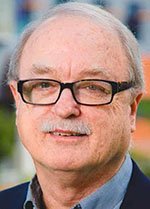By Rick Vacek
GCU News Bureau
Prominent Christian philosopher Dr. J.P. Moreland doesn’t mince words when he talks about his worldview. He deems it necessary because of continued attacks on religion.
“What is at stake today is whether Christianity can be known to be true,” he told a packed classroom of Grand Canyon University students Wednesday night.

They turned out in force to hear two talks, both part of the College of Theology’s One Foundation series: “How Not To Be Secular: Recognizing That Christianity Is a Knowledge Tradition Audience,” and “Arguments from Consciousness against a Naturalistic Worldview.”
The Distinguished Professor of Philosophy in the Talbot School of Theology at Biola University in La Mirada, Calif., who has been ranked among The 50 Most Influential Living Philosophers, left no doubt how he feels about God’s truth. He noted that it has become fashionable in the media and in politics in recent years to blame Christianity for the world’s problems.
He referenced two opinion pieces: “Ground Rules for a Divided Nation” by Paul Krugman in 2011 and “Bush’s God” by Robert Reich, former Secretary of Labor under President Bill Clinton.
The latter was a piece denouncing President George Bush’s frequent references to God as his guiding light as he tried to navigate America through the war on terrorism. In it, Reich wrote:
“The great conflict of the 21st century will not be between the West and terrorism. Terrorism is a tactic, not a belief. The true battle will be between modern civilization and anti-modernists; between those who believe in the primacy of the individual and those who believe that human beings owe their allegiance and identity to a higher authority; between those who give priority to life in this world and those who believe that human life is mere preparation for an existence beyond life; between those who believe in science, reason, and logic and those who believe that truth is revealed through Scripture and religious dogma. Terrorism will disrupt and destroy lives. But terrorism itself is not the greatest danger we face.”
Moreland argues that there are three, not two, worldviews. The first two are the source of so many debates today:
- Ethical monotheism: The world comes from God.
- Scientific naturalism: We can only know what has been proved scientifically.
Moreland is direct in his denunciation of the latter. He gave several examples of times when he has been confronted about his beliefs and how he responded.
“There are things outside science that we know better than things we know inside science,” he said. “… Don’t be bullied by this stuff. Make them answer questions.”
The newest category, in Moreland’s view, is neo-Marxist postmodern relativism, in which truth and reality depend on what side you’re on. What’s notable, he said, is that people who believe this are relativists in areas they agree with but absolutists in other areas.
Moreland said you don’t just choose your beliefs. They are part of who you are. But he also pointed out that you still can believe something even if you have some doubts.
“A true belief is based on adequate reasons,” he said. “It doesn’t mean it’s certain.”
He has no doubt, however, about the existence of three angels who surround him – two shorter ones at his side and a taller one behind him. He talked at length about some interesting spiritual experiences he has had, including multiple people who have told him after one of his talks that they had a vision of those angels.
Moreland considers it his mission to continue to try to help people see those angels and much, much more.
“I define apologetics as a way to help people overcome hindrances that prevent them from finding the kingdom,” he said.
Moreland last spoke at GCU in April 2015, and since then the College of Theology has hired one of his former students, Gary Osmundsen.
Dr. Jason Hiles, the COT Dean, said Moreland was invited back to campus for several reasons, “including the fact that he is a godly man with impeccable academic credentials and a kind, generous heart who supports GCU’s efforts to integrate the Christian worldview across the curriculum.
Hiles added, “He is one of the most popular and well-received speakers we’ve invited to campus, and the reception this time around was no different. His ability to speak at the highest levels of philosophy while addressing pressing, contemporary issues connects well with faculty and students as they wrestle with the challenges of the day.
“He is passionate about the life of the mind and equally passionate about loving the Lord with his entire being, including his intellect. In many ways that makes him an exemplary scholar as we deepen the integration of faith and learning as part of GCU’s One Foundation.”
Moreland views GCU in similar high regard.
“I can’t tell you how much I love this school,” he said. “We need a school like this, to be a large, influential voice for Christianity.”
Contact Rick Vacek at (602) 639-8203 or [email protected].



































































